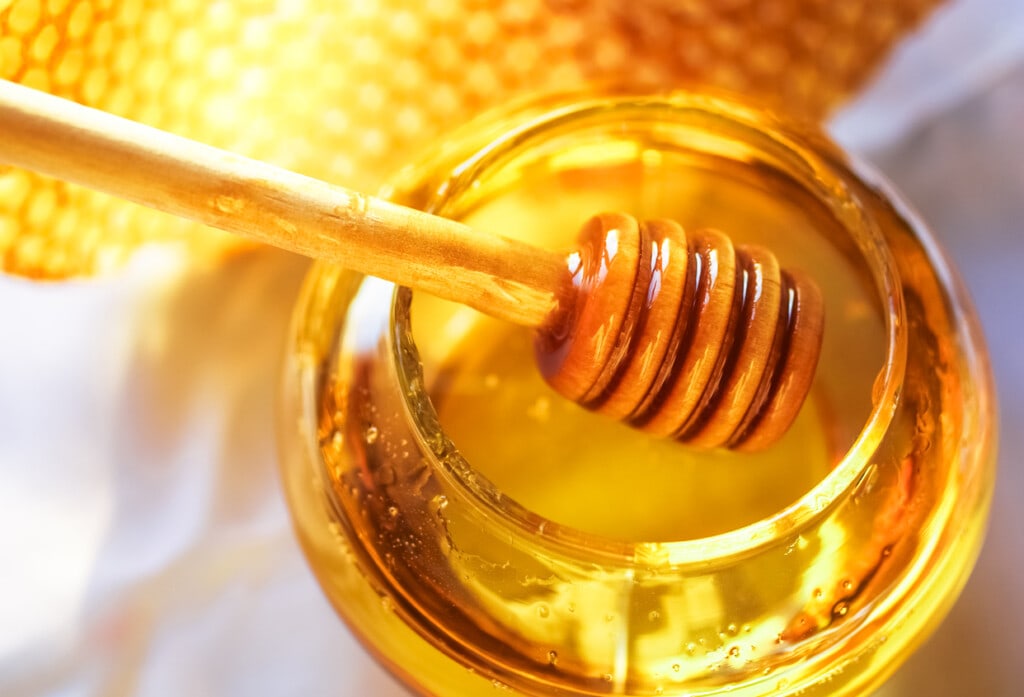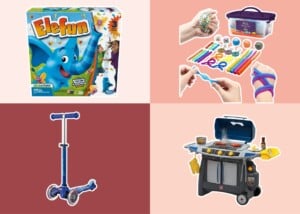While we cherish the sweet moments that life offers us once we have a baby, one delight we should avoid unveiling is the sweetness of honey. Honey is among the few absolute dos and don’ts that exist when introducing foods to our little ones. All major pediatric and public health agencies in the United States agree that babies shouldn’t eat honey, especially infants younger than 12 months, because of the increased risk of infant botulism.1
Infant botulism is a rare but potentially life-threatening danger that may arise when infants consume honey too young. Although there is an average of fewer than 100 reported cases annually in the U.S., it can be devastating for the families affected.1 So it’s important to understand what botulism is and why feeding honey to a baby is not a risk worth taking, plain and simple.
Honey Has a Natural Contaminant
In a survey of honey in the United States, 10% of honey samples contained botulism spores.1 What’s more, honey is the one identified and avoidable source of C. botulinum spores, which are natural contaminants in water, soil, dust, and air that get carried into beehives.1,2,7 Though not inherently harmful, when a baby eats honey and ingests botulism spores, their underdeveloped gut supports its germination and colonization. In addition, this allows the bacterium Clostridium botulinum to grow and produce a neurotoxin. And then, the toxin blocks the transmission of a nerve’s impulse, affecting its ability to signal the associated muscle to contract, which leads to loss of muscle tone and weakness.7
Children Are Not Mini-Adults
You may wonder, why are babies at risk for infant botulism but not older kids and adults? This is an excellent example of how kids are not merely “mini-adults.” Their pathophysiology is different, and this process follows an infectious disease pathway unique to small children. Healthy adults and older children have more developed immune and digestive systems, preventing the Clostridium bacteria from surviving. Their bodies can clear the toxin before it causes harm5, but babies’ bodies can’t, which is why they shouldn’t eat honey.
They Have Immature Intestinal Tracts
In comparison, the intestinal tract in a baby is immature due to the difference in the level of gastric acidity and bacterial flora.2 Babies are at risk for infant botulism until their first birthday. Almost all cases reported in the U.S. (99.8%) have occurred in children younger than 1, the majority (over 90%) occurring in the first six months of life.4
Infant Botulism Symptoms Are Hard to Miss
You do not have to worry that you will miss botulism in your child. The characteristics of this disease are straightforward and progressive. The hallmark of infant botulism is weakness and fatigue with repetitive muscle activity. The illness often begins with constipation due to slow gut mobility. Still, it is usually first noticed as difficulty feeding with gag, suck, and swallowing changes. There is also a weak and altered cry, breathing difficulties, and diminished facial expression. There is loss of muscle tone and flaccid or limp symmetric and descending paralysis, starting at the head and working down the body.3,4,6,8 Paralysis affects motor nerves, which means their sensory nerves remain intact. They can hear and feel normally. The neurotoxin does not penetrate the brain, which means it does not cause permanent brain damage.4
Treating Infant Botulism
The treatment uses a human-derived anti-toxin called botulism immune globulin intravenous (BIGIV), approved by the FDA. If there is clinical suspicion that a child has infant botulism, their doctor must initiate this treatment immediately and not wait for test results to confirm the diagnosis. A randomized, double-blinded, placebo-controlled treatment trial revealed that timely treatment results in much better outcomes. This includes a significantly shorter hospital stay and more rapid strength, tone, and movement recovery.5,11 You and your doctor should not delay treatment.
In the hospital, we offer comprehensive supportive care for the baby’s breathing, nutrition, and bowel and bladder management.4 A baby might need a breathing machine (a ventilator) for a few weeks until their breathing muscles get stronger. Botulism can also affect the swallowing muscles, so babies usually need IV fluids or feedings through a tube to get nourishment.4,5 Expressed breast milk given via feeding tubes is optimal nutrition. Doctors should reassure breastfeeding mothers that breast milk does not transmit botulism. A breastfeeding mother who eats honey will not pass these spores to her child. And breastfeeding may slow the onset of illness if it develops.1,4,9
Children Should Fully Catch Up with Milestones
Recovery results from the regrowth of the nerve endings that signal the muscles to contract. This regeneration is a process that can take several weeks.4 In the absence of complications, the prognosis for these patients is excellent, and parents can anticipate complete recovery from the disease. Parents can expect their children to fully catch up in motor milestones. A child with infant botulism will retain their intelligence and personality, while their athletic abilities and other potential motor skills will remain intact.4
Yes, infant botulism is terrifying, but remember that it is uncommon and preventable because babies shouldn’t eat honey. Since identifying it in 1976, we have learned what it is and what we can do to avoid it and treat it. As you know, many things are out of our control as parents that we cannot do to protect our children fully. The good news is that this is something we have a say over! If we avoid feeding honey to babies under one, we avoid infant botulism. Parents must be informed about honey’s danger to their children. Thanks for doing your part in passing along this critical public health message — it is so very sweet of you!
Disclaimer: While I am a doctor, I am not your doctor. All content presented in this article is for educational purposes only. It does not constitute medical advice and does not establish any kind of doctor/patient relationship. Speak to your healthcare provider about any questions or concerns you may have.






























